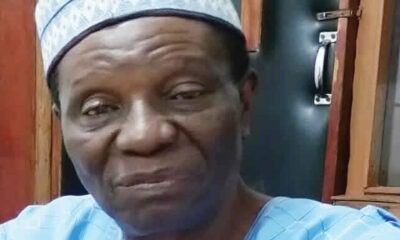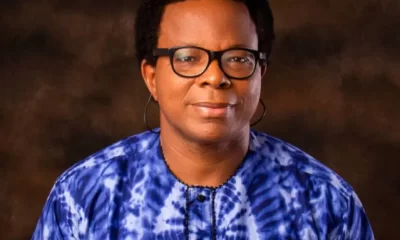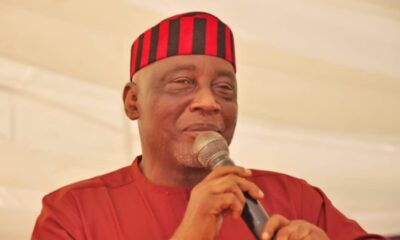Global Issues
Sit-tight Syndrome: Beyond African Politics -By Star Arinbomen
Among the current political honchos in Africa who have continued to demonstrate sit-tight syndrome are Yoweri Museveni of Uganda (president since 1986), Denis Sassou Ngueso of the Republic of Congo (president since 1997), Faure Gnassingbe of Togo (president since 2005), Teodoro Obiang Nguema Mbasogo of Equatorial Guinea (president since 1979) and Paul Biya of Cameroon (president since 1982).

The flowing cassock notwithstanding, the influence of the human instinct is always perceptible. Regardless of race, socio-cultural inclination or geographical location, humans have proclivities that bear some comparability. Given similar circumstances, such comparable inclinations always foreshadow same trajectories; however, diverse outcomes may ensue.
Sit-tight syndrome is a catchphrase that is essentially used to describe the tendency of African leaders to hold on to power contrary to the wish of their people, and in defiance of extant statutes. The use of the phrase has been popularized by both academic and professional journalists in Africa.
While the use of “sit-tight syndrome” in journalistic works has made the essence of the concept synonymous with African leadership style, it is imperative to underscore that the insatiable quest for perpetual political reign is not the exclusive inclination of African leaders. History is replete with political leaders in different continents of the world who have, at different points in time, demonstrated subversive and manipulative tendencies in order to remain in power.
Sit-tight syndrome is often characterized by an aura of apparent invincibility. It imbues the psyche of the object of its influence with the feeling of being teflon, immaculate and unassailable. Thus, under the influence of this syndrome, the object develops a parochial worldview; and considers those with conflicting perspectives adversaries. Besides, there is interference with legislative and judicial processes culminating in alteration of extant statutes.
In Africa, sagas of political leaders who demonstrated sit-tight syndrome, as well as of those who are still tethered to its influence, have continued to reverberate beyond the borders of the continent. Some of these protagonists had full gratification of their quest for power, after which they set the terms of relinquishing power. Some were stopped in their tracks by more brutal influence, becoming pariahs in the process. Perhaps by dint of fate, some African protagonists of sit-tight-syndrome have successfully defied all odds and remained in power, since they made their first foray. Within the confines of Africa, this piece reviews some of the continent’s diehard protagonists of sit-tight-syndrome.
In Togo, the Gnassingbe family has ruled the country for over five and a half decades uninterrupted. Gnassingbe Eyadema was president of Togo for 38 years, from 1967 until his untimely death in 2005. He participated in two successful coups in 1963 and 1967. The second coup culminated in his ascension to power. With a single party regime and subsequent embracement of a multiparty system, he cleverly manipulated the system to maintain a firm footing on his country’s political landscape. At the time of his death, Gnassingbe Eyadema was Africa’s longest-serving ruler. The reins of power have, however, remained in the Gnassingbe family; as Faure Gnassingbe, Eyadema’s son, was instantaneously clad with the mantle of leadership of the Togolese presidency, following his father’s death. Faure Gnassingbe is currently serving his fourth term as president of Togo; and so far, he has been in power for 18 straight years.
In Angola, Jose Eduardo dos Santos will be remembered for clinging to power as president for 38 years in a row, from 1979 until 2017, after which he consented to power transition. He died four years after relinquishing power. The tale is similar in Zimbabwe, where Robert Mugabe held sway as president for 30 years, from 1987 until 2017 when he was forced to abdicate power by his political party, the Zimbabwe African National Union-Patriotic Front (ZANU-PF). Robert Mugabe was 93 years old when he stepped down as president of Zimbabwe; and he died 2 years later.
Also, Kwame Nkrumah of Ghana, Zine El Abidine Ben Ali of Tunisia, Hosni Mubarak of Egypt, Felix Houphouet-Biogny of Ivory Coast, Omar Bongo Ondimba of Gabon and Muammar Gaddafi of Lybia are among the deceased African leaders, who wielded political power with sit-tight inclination during their reigns.
Among the current political honchos in Africa who have continued to demonstrate sit-tight syndrome are Yoweri Museveni of Uganda (president since 1986), Denis Sassou Ngueso of the Republic of Congo (president since 1997), Faure Gnassingbe of Togo (president since 2005), Teodoro Obiang Nguema Mbasogo of Equatorial Guinea (president since 1979) and Paul Biya of Cameroon (president since 1982).
In the oil-rich Equatorial Guinea, Teodoro Obiang Nguema Mbasogo has set an unprecedented record in the world. He is currently the world’s longest-serving president, having held on to power for 43 years in a row. Seizing power from his uncle in 1979, after a military takeover, he has continued to manipulate relevant laws and institutions in order to remain in power. Now 80 years old, he won a sixth term in office as president of Equatorial Guinea in November 2022 with 95% of the votes cast. His son, Teodoro Nguema Obiang Mangue, has been vice president of the country since 2016.
Beyond the tale of African leaders’ inclination to hold on to power, there is documented evidence of uncanny penchant for perpetual reign by political leaders in other continents of the world. A survey of the remote and the recent political goings-on in Asia, Europe and North America attests the kernel of this piece.
Hun Sen of Cambodia is an epitome of a political leader with sit-tight inclination in the Asian continent. Authoritarian in his leadership style, he has ruled his country as an incumbent Prime Minister for 38 years. Under his leadership, Hun Sen has stifled free speech in Cambodia by shutting down most independent media in the country and issuing threats of closure to NGOs, trade unions and Rights groups. He has also been intolerant of his political opponents, many of whom have been imprisoned or forced into exile. Just few days after the ruling Cambodian People’s Party won a landslide victory in the July 2023 general elections, Hun Sen announced that he will be handing over the reins of power to his son, Hun Manet, in the coming weeks. Even after his resignation as Prime Minister, Hun Sen is expected to continue to wield immense political clout, as he will retain the leadership of the ruling party. He is also expected to become the country’s senate president.
In China Xi Jinping was elected president of the country in 2013, under a constitution that allowed a maximum of two five-year terms. Driven by the proclivity for absolute power, he surreptitiously began to encroach on the institutions that had hitherto maintained the sanctity of his country’s leadership configuration. He surgically purged any existing or potential challenger of his quest for perpetual reign, and flanked himself with amenable allies. In 2018, he made a political breakthrough- China’s parliament scrapped the two-term limit on the country’s presidency. In October 2022 Xi was confirmed for third term as General Secretary of the Chinese Communist Party, President of China and Chairman of the Central Military Commission. Now the face of China’s politics, the coast is clear for him to reign as China’s supreme leader for as long as possible.
Benjamin Netanyahu of Israel represents another quintessence of a political leader with insatiable quest for power. Currently Israel’s longest-serving premier, Benjamin Netanyahu has served as Prime Minister for over 15 years. He was Israel’s Prime Minister from 1996 to 1999; then from 2009 to 2021. He lost power in 2021 over allegations of fraud, breach of trust and corruption leveled against him. Determined to remain in the political limelight, he staged a comeback in 2022. Through an unholy pact with hard-liners and religious extremist groups in Israeli parliament, he was able to secure a win in the 2022 elections. On July 24 this year, the Israeli parliament passed the first bill of the Netanyahu government’s controversial “judicial overhaul plan”. The controversial bill limits the Supreme Court’s oversight of government actions and policies and ends the court’s ability to strike down government decisions and appointments.
In Europe, evidence also abounds of leadership styles that smack of sit-tight syndrome. The leadership styles in two former members of the defunct Soviet Union, Russia and Belarus, readily come to mind. Alexander Lukashenko of Belarus and Vladimir Putin of Russia epitomize contemporary dictators whose reputations can be related to globally.
Vladimir Putin is Russia’s longest-serving leader since the end of the reign of Joseph Stalin, the Soviet dictator. Putin has been in power for more than two decades. He served two presidential terms from 2000 to 2008; after which he moved to the office of the prime minister from 2008 to 2012, having served briefly in the same office from 1999 to 2000. Vladimir Putin reclaimed the mantle of Russia’s presidency in 2012, following the extension of the presidential term to six years under Dmitry Medvedev. By Virtue of Russia’s 1993 constitution, Putin could potentially remain in office till 2024, following his ratification as Russia’s president in 2012. However, driven by the penchant for power, he set in motion the clandestine machinery for amending the constitution. By January 2020, Putin had successfully introduced a clause into the constitution. The clause reset Putin’s previous term limits, allowing him to run for president two more terms; meaning he could potentially remain in power until 2036. Perhaps the last is yet to be seen or heard of Putin’s insatiable quest for power.
In Belarus, Alexander Lukashenko is currently the longest-sitting European president. Christened “Europe’s last dictator”, Lukashenko has been the first and only president of Belarus since 1994, when the office was established. His nearly three-decade rule has been characterized by moves to consolidate power, human rights abuses and electoral irregularities. In 2020, he won a controversial sixth term in office with 80% of the votes cast. The outcome of the elections was, however, dismissed as fraudulent by many western leaders.
In the Democratic People’s Republic of Korea, commonly known as North Korea, the Kim family wields absolute power through the Workers’ Party of North Korea (WPK). In what qualifies as a monarchical leadership, the Kim family has been in charge of supreme leadership of North Korea since its inception in 1948. The country is currently superintended by Kim Jong-Un, who assumed the mantle of leadership in 2011.
In North America, Fidel Castro will always be remembered for his firm grip on power as Cuban president. During his reign in Cuba that lasted almost 5 decades, Castro held all three most powerful positions in Cuba’s government- President of the Council of State, President of the Council of Ministers and First Secretary of Cuban Communist Party. His government punished all forms of dissent; and it refused to recognize alternative political parties. Fidel Castro ascended to power in 1959 after leading a revolution that toppled the government of Fulgencio Batista; and he subsequently relinquished power to his brother, Raul Castro, in 2006. Fidel Castro died in 2016 at the age of 90 years.
While it is incontrovertible that African leaders exhibit weird penchant for perpetual reign, the same predilection has been demonstrated by leaders in other political landscapes besides Africa; albeit with different dynamics and on a different scale. Therefore, the scope of usage of the phrase “sit-tight syndrome” should not be circumscribed to the context of African politics. Rather, the scope of usage the concept should be broadened to encompass other political spheres in addition Africa. After all, what is sauce for the goose is sauce for the gander.
Arinbomen Star,
Ife. (starins4real@yahoo.com)










